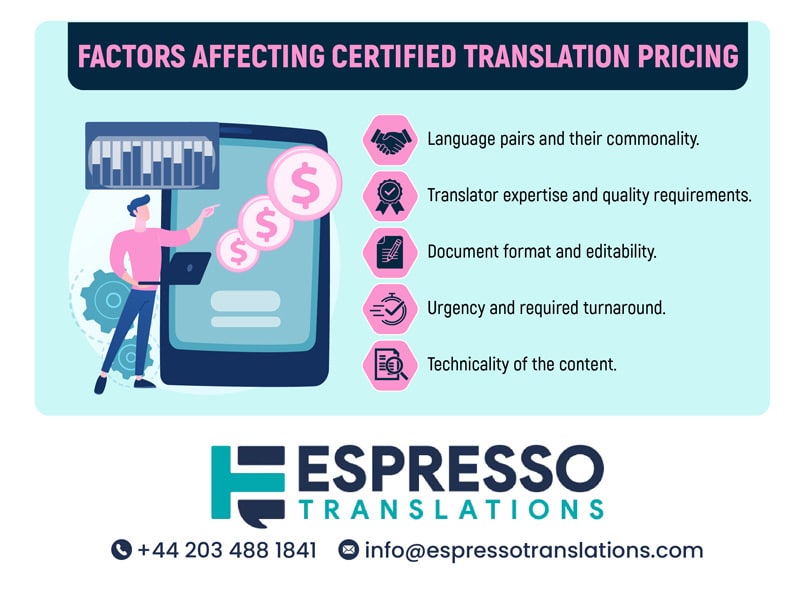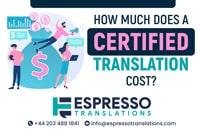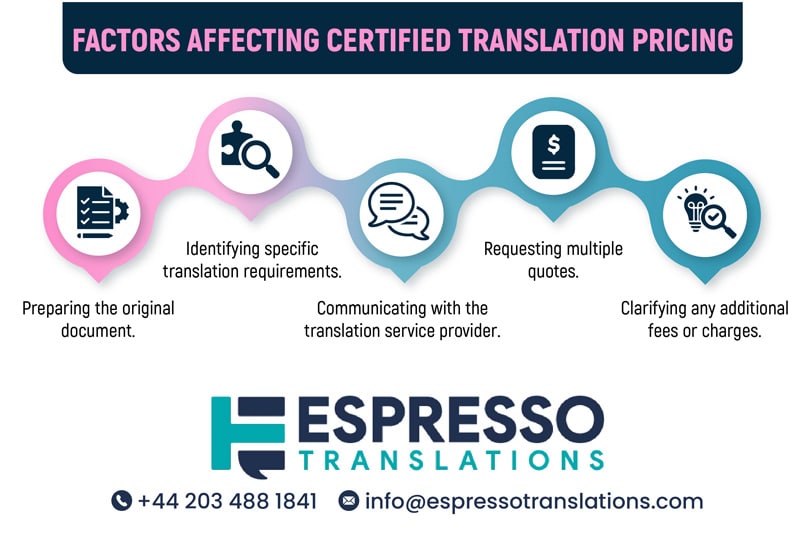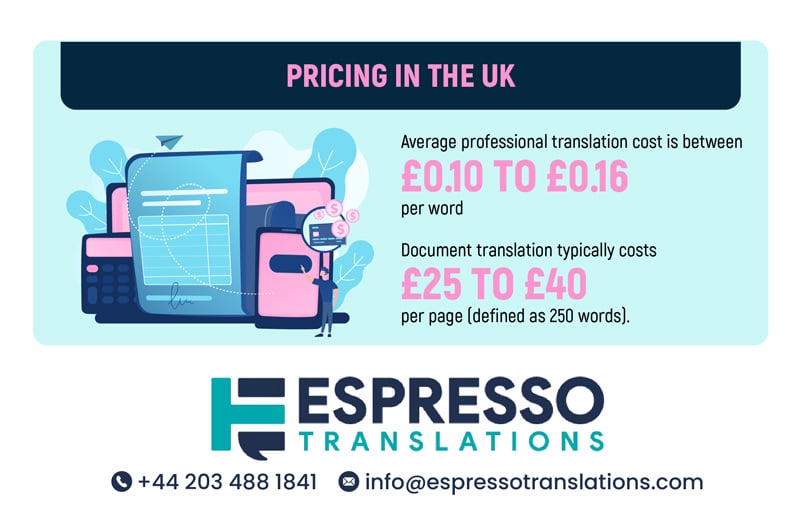Many factors affect the cost of a certified translation. Among them are the source and target languages, how quickly you need the translation, the length of the document or documents and whether the content to be translated is technical in nature. There may also be formatting elements to be figured on in the cost of translation.
| Translation Type | Explanation | Cost | Possible Additions to the Basic Fee | Notes |
|---|---|---|---|---|
| Certified Translation | The translator or translation agency provides a signed certification along with the translated document, attesting that the translated text is a true representation of the original document. | Medium | +10% to +30% | Common for legal translation and immigration services documents. |
| Sworn Translation | This type of translation is performed by a government-approved translator who has sworn an oath in court to provide true and accurate translations. | High | +20% to +50% | Common in countries like Spain and the Netherlands. The translator is legally responsible for the translation’s accuracy. |
| Notarized Translation | The translator’s declaration of accuracy is confirmed by a notary public. | Higher | +30% to +60% | Notaries charge a fee to notarize the translator’s statement of accuracy. The translation itself is not notarized. |
| Legalized Translation | A suitable official authority or embassy certifies that the translated document is true and accurate. | Highest | +50% to +100% | Foreign governments often require this. The process can be lengthy and expensive. |
How much does an official translation cost?

Document translation services vary in cost based on a number of elements. What you pay for a certified translation depends on the factors listed below:
1. Language pair
A large part of the cost of a certified translation is the two languages involved. Common language pairs like English to Spanish tend to be much less expensive than language pairs that include a rarer language like Maori. The law of supply and demand applies here, because if fewer translators can handle a particular language pair, those translators may charge more for their services.
2. Translator expertise
In the translation industry, as in many fields, you usually get what you pay for. Highly skilled translators who have lots of experience and specialized knowledge can charge more for their higher quality product. When a document contains legal, medical or other technical subject matter, your translation needs a professional translator who is an expert in that subject. Remember that, when you hire a qualified professional, part of what you are paying for is the likelihood that your translated document will be accepted by the relevant authorities, courts or international trade organizations.
3. Document format
Unusual document types also can affect the translation quote you receive for your certified translation. Your source document will be easier to work on if you can provide it in one of the common file formats like DOCX, XLS, PPT, PDF, Indesign, XML, SGML or HTML, among others. The importance of an editable format increases if the file is more complex and includes images, graphs and other layout elements. When you provide a scanned image of a paper document rather than an electronic file that can be edited, you will incur translation fees for reproducing the format or rendering the final document translation in Desktop Publishing (DTP).
4. Urgency
When you need a document translated in a short time, rush fees and the like can increase your document translation rates. If the deadline is more relaxed, your cost will be lower. For an urgent project, translation agencies may have to assign more than one certified translator, or an individual translator will have to work longer hours to complete the project punctually. Work that requires more translators and/or a heavier workload will come at a higher price.
5. Technicality
When the specific document to be translated is highly technical (court documents, medical reports and scientific papers are examples), this makes it more expensive to translate. You will pay more than you would for content like letters or general interest articles that don’t call for specific expertise in certain subjects. The more technical the document, the more you will need qualified translators with special knowledge in a particular field.

5 steps to get an accurate certified translation services cost for your project
You can affect the cost of a certified translation to some extent. Careful preparation for your project is the key to a lower bill and a successful outcome. As much as possible, follow the five steps below for the best results.
- Prepare the original document before submitting it.
Usually, you will not need the original document or a paper copy of it. What you should have ready is an electronic document or at least a clear, legible scan of it. Make sure you send in something of good quality that is easy to work on. If parts of the document are cut off or otherwise illegible, your project may take longer to complete, which means you will be quoted a higher fee.
The number of words or pages to be translated is another important factor. Many translators charge by the word, so if you know the “word count” you will be closer to knowing the final cost. Personal documents like birth certificates or diplomas are shorter and thus cost less in general. Longer documents like contracts or legal proceedings will bring the price up.
- Identify your specific translation requirements.
Be sure to ask the intended recipient of the translated document what they need. Official requirements vary from country to country, and different organizations have different rules to be followed. How the translation will be used may have some bearing on this.
Check the relevant government website in the country where you will submit your documents to learn which type of official translation is required for your specific procedure. If you have a hard time locating the requirements online, you might try calling the government agency in question or contacting your local embassy for help.
Apostilles are required for certain types of documents before they can be translated, so do your homework to find out if this is needed for your project.
If you are dealing with the United States, be aware that states can have their own requirements. A document accepted in Texas might be rejected in California, for instance, so again, ask questions ahead of time.
3. Find a translation service provider.
For an indication of high-quality work, check whether the translator or agency you are considering is ISO-certified 17100 or has accreditation from a major translation body like the ATC.
As with other businesses, online reviews and client testimonials can give you an idea of whether the translation service provider has a good reputation for providing accurate, timely work that is free of errors.
Good translators or project managers will talk you through the entire translation process to be sure that you understand everything that is involved.
- Ask for multiple quotes and compare them.
Fees vary, so ask several translation service providers for quotes, and ask questions about any that are much higher or lower than the others. Again, keep in mind that you get what you pay for, and translators with many years of experience and lots of special expertise will probably charge more, and for good reason.
Be careful, because hiring the cheapest provider may ultimately cost you more. In legal document translation, using the wrong words can influence the outcome of your proceeding. Errors or omissions in documents related to a citizenship application could also cost you time and money at a later stage.
- Clarify any possible extra fees or charges.
Be sure that communication is clear and thorough on all sides. Many translation companies charge postage fees or project management fees. You will need to pay the government administrative or duty fees in some countries. The more questions you ask now, the fewer surprises you should encounter later. Espresso Translations has no hidden fees and does not charge for project management, and we will tell you the total cost in advance.

How much does a 1000 word translation cost?
The price per word for translations in the United States typically ranges from $0.10 to $0.16. For example, a document that contains 1,000 words will likely cost you somewhere between $100 and $160 when done at an industry-standard rate. Some providers charge by the page, however.
Naturally, if your project requires a more experienced translator or some particular special knowledge or skill, the translation rate will be higher.
Please note that the prices in this guide illustrate the state of the market when the guide was published. As the cost of living soars and inflation marches on, translation prices may also climb.
How much does USCIS certified translation cost?
For documents accepted by the United States Citizenship and Immigration Services or USCIS, standard translation rates may range from $0.10 to $0.16 per word. This means that getting a certified translation will cost you, on average, about $0.12 or $0.13 per word. As outlined above, the cost will be based on the exact document in question, the two languages involved, any formatting issues, and any official requirements like a translation certificate or an apostille.
Also Read: What is the difference between certified and sworn translations?
How do you calculate the translation rate?
The number of words in your original document (called “source words”) will generally determine what a certified translation will cost. Occasionally, a translator will charge per target word, especially for longer documents that are not electronic, and this can make it difficult to calculate the final price. Another factor is that one particular language may use more words to say the same thing that another language can render more concisely.
If you translator charges on a per-page basis, consider your document’s font size, line spacing, and any other elements that could affect the number of pages, and therefore the cost.
Furthermore, some translation service providers charge by the hour, which makes it even tougher to estimate the cost.
Is the price for a certified translation per page or per word?
Certified translation pricing is usually calculated based on the number of words to be translated, rather than on a per-page basis. Providing an editable electronic document for your project can help you determine what your project will cost before the work even starts. Providing an uneditable document for which the words can’t be counted means that the translator will quote you a per-page rate.
How much does document translation cost per page in the US?

Certified translation services in the US average around $0.10 to $0.16 per word. A page may be defined as 250 words, resulting in a cost of $25 to $40 for that page. As always, your cost will depend on multiple factors such as the language combination involved, the turnaround time required, the complexity of the text, and the type of document (is it a birth certificate, or is it a legal document?), and so forth.
How much does it cost to translate a document?
The “per word” rates for certified translation in the US vary from $0.10 to $0.16. Each translator or translation agency will charge its own rates. See above for the various factors that influence pricing, such as which languages you need, what the document will be used for, the urgency of the project, etc.
FAQ
How to reduce the cost of document translation with translation software?
You could, in theory, use translation software to keep your certified translation inexpensive. Computer assisted translation (CAT) uses what is called a translation memory. The advantages of this are, first, cheaper translation projects. Second, a translator using a CAT tool can do more translations in the time available.
What is machine translation, and can I use it for official translations?
Sometimes computers can translate a document from the source language to the target language with no intervention from a human being. You may have heard of Google Translate or Deepl, which are machine translation programs.
This kind of machine generated translation is certainly faster, and it results in cheaper document translation, especially when the computer can store a database of terms to be used again later in similar documents. Progress is taking place as technology evolves, especially technology using artificial intelligence (AI). Dynamic machine learning, in which the computer “learns” as it works, is increasingly used these days.
Please note, however, that the use of translations done by AI could invalidate your translated documents for official use. A human translator must make a declaration about the accuracy of their translation in order for it to be put to official use (this is a certified translation). With a computer translation of a document, it is impossible for a person to credibly claim that the translation is a true representation of the original document. Hiring a professional translator who provides high quality translation services ensures that you can obtain a certified translation.
How much are certified translations from Espresso Translations?
To get a price for your certified translation from Espresso Translations, ask our team for a quote today. Within the hour, you will get a quote with the US price for a certified translation, with no hidden fees.
In our professional translation services, we handle all personal or important documents with an eye on security, and we follow all current regulations. To learn more, please refer to our privacy policy.

